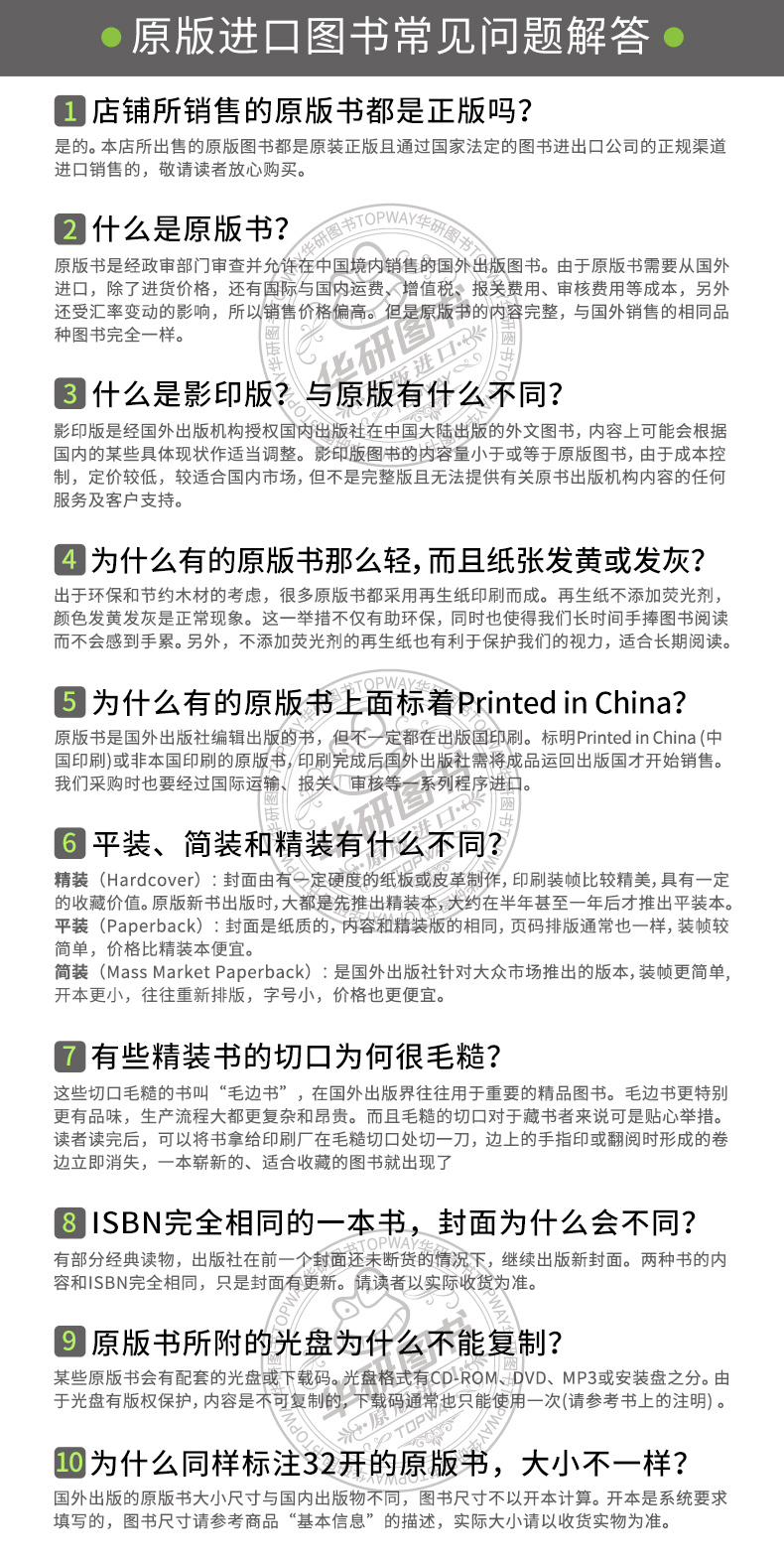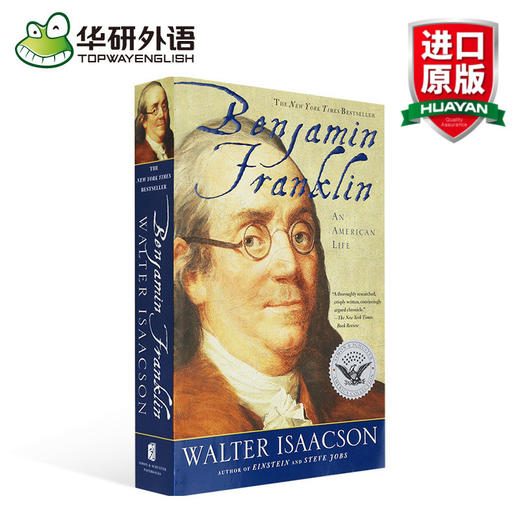华研原版 Benjamin Franklin 富兰克林传 英文版 一个美国人的生活
| 运费: | ¥ 0.00-999.00 |
| 库存: | 75 件 |
商品详情


书名:Benjamin Franklin富兰克林传 一个美国人的生活
作者:Walter Isaacson
出版社名称: Simon & Schuster
出版时间:2004
语种:英文
ISBN:9780743258074
商品尺寸: 15.6 x3.7 x 23.4 cm
包装:平装
页数:592

“诚实和勤勉,应该成为你永久的伴侣。”
Benjamin Franklin《富兰克林传》的作者为美国知名传记作家沃尔特?艾萨克森,他撰写过《史蒂夫?乔布斯传》《基辛格传》《爱因斯坦:生活和宇宙》等多部畅销传记。正如我们所知,本杰明?富兰克林是美国伟大的先驱者和美国民主缔造者之一。作为一个传奇人物,他参与了《独立宣言》与美国宪法的起草,而且在科学、文学、外交等诸多领域也有突出的贡献。
本书是英文原版,艾萨克森以其纯熟的写作手法,清晰地刻画出这位美国伟人高尚的品格及坚毅的精神。书本印刷清晰,彩色夹页展示了富兰克林的不少珍贵照片。可以说,这本《富兰克林传》极具权威性及可读性,它能够启发每一位读者,是一本值得珍藏的好书。
媒体推荐:
“本书逻辑清晰、通俗易懂,准确地反应了富兰克林为人所共知的实用主义精神……本书将再次引发火爆的‘富兰克林热’。”——《纽约时报》
“本书实属极佳之作……艾萨克森敏锐地把握住了富兰克林这位在美国历史上具有重要地位的天才的本质。”——《出版者周刊》
“本书是目前为止极具可读性的有关富兰克林的传记。”——《华盛顿邮报图书世界》
“充满活力、活泼有趣、贴近生活。”——《纽约客》
“本书考据详实、笔法自然、通俗易懂,对富兰克林及其所处时代的把握极富洞见,同时又不乏惊人之语。若想了解美国精神是如何形成的,阅读此书则大有裨益。”——《福布斯》
Benjamin Franklin, writes journalist and biographer Walter Isaacson, was that rare Founding Father who would sooner wink at a passer-by than sit still for a formal portrait. What’s more, Isaacson relates in this fluent and entertaining biography, the revolutionary leader represents a political tradition that has been all but forgotten today, one that prizes pragmatism over moralism, religious tolerance over fundamentalist rigidity, and social mobility over class privilege. That broadly democratic sensibility allowed Franklin his contradictions, as Isaacson shows. Though a man of lofty principles, Franklin wasn’t shy of using sex to sell the newspapers he edited and published; though far from frivolous, he liked his toys and his mortal pleasures; and though he sometimes gave off a simpleton image, he was a shrewd and even crafty politician. Isaacson doesn’t shy from enumerating Franklin’s occasional peccadilloes and shortcomings, in keeping with the iconoclastic nature of our time—none of which, however, stops him from considering Benjamin Franklin “the most accomplished American of his age,” and one of the most admirable of any era. And here’s one bit of proof: as a young man, Ben Franklin regularly went without food in order to buy books. His example, as always, is a good one—and this is just the book to buy with the proceeds from the grocery budget.
Review
“The most readable full-length Franklin biography available.” —The Washington Post Book World
“Energetic, entertaining, and worldly.” —The New Yorker
“In its common sense, clarity and accessibility, it is a fitting reflection of Franklin’s sly pragmatism.... This may be the book that most powerfully drives a new pendulum swing of the Franklin reputation.” —The New York Times
“A thoroughly researched, crisply written, convincingly argued chronicle.” —The New York Times Book Review

本杰明?富兰克林(Benjamin Franklin,1706.1.17~790.4.17),美国伟大的先驱者和美国民主缔造者之一,知名的科学家、发明家、政治家、外交家、文学家、实业家,他也是美国独立运动的领导人。他一生参与了美国多项重要文件的起草,包括《独立宣言》及美国宪法。他曾说:这也是他一生的真实写照。
Benjamin Franklin《富兰克林传》的作者沃尔特?艾萨克森是美国知名的传记作家,曾撰写过《史蒂夫?乔布斯传》《富兰克林传》《基辛格传》《爱因斯坦:生活和宇宙》等多部畅销的传记作品。在本书中,艾萨克森凭借其精湛的写作功底,记录了富兰克林的过人胆识及其传奇般的成功人生。我们将看到,富兰克林——这位非常有魅力的美国国父是如何缔造出美国精神,创造出属于他自己的时代。
正如托马斯?杰斐逊所言:“在我的一生中,能让我佩服的人有三位:第一位是本杰明?富兰克林;第二位也是本杰明?富兰克林;第三位还是本杰明?富兰克林。富兰克林出生时比我们中非常穷的人还要穷,但他具有不以自己的穷困为耻的勇气,并凭借这勇气成为他生活的时代和国家中极伟大和出色的人。”
Benjamin Franklin is the founding father who winks at us, the one who seems made of flesh rather than marble. In this authoritative and engrossing full-scale biography, Walter Isaacson shows how the most fascinating of America’s founders helped define our national character.
In a sweeping narrative that follows Franklin’s life from Boston to Philadelphia to London and Paris and back, Isaacson chronicles the adventures of the spunky runaway apprentice who became, during his 84-year life, America’s best writer, inventor, media baron, scientist, diplomat, and business strategist, as well as one of its most practical and ingenious political leaders. He explores the wit behind Poor Richard’s Almanac and the wisdom behind the Declaration of Independence, the new nation’s alliance with France, the treaty that ended the Revolution, and the compromises that created a near-perfect Constitution.
Above all, Isaacson shows how Franklin’s unwavering faith in the wisdom of the common citizen and his instinctive appreciation for the possibilities of democracy helped to forge an American national identity based on the virtues and values of its middle class.

沃尔特?艾萨克森,美国知名的传记作家,曾获得哈佛大学历史与文学学士学位及牛津大学阿斯彭研究所(Aspen Institute)首席执行官,历任美国有线电视新闻网(CNN)董事长和《时代》杂志总编。其主要作品有《史蒂夫?乔布斯传》《基辛格传》《爱因斯坦:生活和宇宙》等多部畅销书,其中《爱因斯坦:生活和宇宙》曾荣获美国国家科学总院2008年度科学传播图书奖。
Walter Isaacson, the President of the Aspen Institute, has been the chairman of CNN and the managing editor of Time magazine. He is the author of Kissinger: A Biography and the co-author of The Wise Men: Six Friends and the World They Made. He lives in Washington, D.C., with his wife and daughter.

CHAPTER ONEBenjamin Franklin and the Invention of America
CHAPTER TWOPilgrim’s Progress: Boston, 1706-1723
CHAPTER THREEJourneyman: Philadelphia and London, 1723-1726
CHAPTER FOURPrinter: Philadelphia, 1726-1732
CHAPTER FIVEPublic Citizen: Philadelphia, 1731-1748
CHAPTER SIXScientist and Inventor: Philadelphia, 1744-1751
CHAPTER SEVENPolitician: Philadelphia, 1749-1756
CHAPTER EIGHTTroubled Waters: London, 1757-1762
CHAPTER NINEHome Leave: Philadelphia, 1763-1764
CHAPTER TENAgent Provocateur: London, 1765-1770
CHAPTER ELEVENRebel: London, 1771-1775
CHAPTER TWELVEIndependence: Philadelphia, 1775-1776
CHAPTER THIRTEENCourtier: Paris, 1776-1778
CHAPTER FOURTEENBon Vivant: Paris, 1778-1785
CHAPTER FIFTEENPeacemaker: Paris, 1778-1785
CHAPTER SIXTEENSage: Philadelphia, 1785-1790
CHAPTER SEVENTEENEpilogue
CHAPTER EIGHTEENConclusions
Cast of Characters
Chronology
Currency Conversions
Acknowledgments
Sources and Abbreviations
Notes
Index

Chapter One: Benjamin Franklin and the Invention of America
His arrival in Philadelphia is one of the most famous scenes in autobiographical literature: the bedraggled 17-year-old runaway, cheeky yet with a pretense of humility, straggling off the boat and buying three puffy rolls as he wanders up Market Street. But wait a minute. There’s something more. Peel back a layer and we can see him as a 65-year-old wry observer, sitting in an English country house, writing this scene, pretending it’s part of a letter to his son, an illegitimate son who has become a royal governor with aristocratic pretensions and needs to be reminded of his humble roots.
A careful look at the manuscript peels back yet another layer. Inserted into the sentence about his pilgrim’s progress up Market Street is a phrase, written in the margin, in which he notes that he passed by the house of his future wife, Deborah Read, and that “she, standing at the door, saw me and thought I made, as I certainly did, a most awkward ridiculous appearance.” So here we have, in a brief paragraph, the multilayered character known so fondly to his author as Benjamin Franklin: as a young man, then seen through the eyes of his older self, and then through the memories later recounted by his wife. It’s all topped off with the old man’s deft little affirmation — “as I certainly did” — in which his self-deprecation barely cloaks the pride he felt regarding his remarkable rise in the world.
Benjamin Franklin is the founding father who winks at us. George Washington’s colleagues found it hard to imagine touching the austere general on the shoulder, and we would find it even more so today. Jefferson and Adams are just as intimidating. But Ben Franklin, that ambitious urban entrepreneur, seems made of flesh rather than of marble, addressable by nickname, and he turns to us from history’s stage with eyes that twinkle from behind those newfangled spectacles. He speaks to us, through his letters and hoaxes and autobiography, not with orotund rhetoric but with a chattiness and clever irony that is very contemporary, sometimes unnervingly so. We see his reflection in our own time.
He was, during his eighty-four-year-long life, America’s best scientist, inventor, diplomat, writer, and business strategist, and he was also one of its most practical, though not most profound, political thinkers. He proved by flying a kite that lightning was electricity, and he invented a rod to tame it. He devised bifocal glasses and clean-burning stoves, charts of the Gulf Stream and theories about the contagious nature of the common cold. He launched various civic improvement schemes, such as a lending library, college, volunteer fire corps, insurance association, and matching grant fund-raiser. He helped invent America’s unique style of homespun humor and philosophical pragmatism. In foreign policy, he created an approach that wove together idealism with balance-of-power realism. And in politics, he proposed seminal plans for uniting the colonies and creating a federal model for a national government.
But the most interesting thing that Franklin invented, and continually reinvented, was himself. America’s first great publicist, he was, in his life and in his writings, consciously trying to create a new American archetype. In the process, he carefully crafted his own persona, portrayed it in public, and polished it for posterity.
Partly, it was a matter of image. As a young printer in Philadelphia, he carted rolls of paper through the streets to give the appearance of being industrious. As an old diplomat in France, he wore a fur cap to portray the role of backwoods sage. In between, he created an image for himself as a simple yet striving tradesman, assiduously honing the virtues — diligence, frugality, honesty — of a good shopkeeper and beneficent member of his community.
But the image he created was rooted in reality. Born and bred a member of the leather-aproned class, Franklin was, at least for most of his life, more comfortable with artisans and thinkers than with the established elite, and he was allergic to the pomp and perks of a hereditary aristocracy. Throughout his life he would refer to himself as
“B. Franklin, printer.”
From these attitudes sprang what may be Franklin’s most important vision: an American national identity based on the virtues and values of its middle class. Instinctively more comfortable with democracy than were some of his fellow founders, and devoid of the snobbery that later critics would feel toward his own shopkeeping values, he had faith in the wisdom of the common man and felt that a new nation would draw its strength from what he called “the middling people.” Through his self-improvement tips for cultivating personal virtues and his civic-improvement schemes for furthering the common good, he helped to create, and to celebrate, a new ruling class of ordinary citizens.
The complex interplay among various facets of Franklin’s character — his ingenuity and unreflective wisdom, his Protestant ethic divorced from dogma, the principles he held firm and those he was willing to compromise — means that each new look at him reflects and refracts the nation’s changing values. He has been vilified in romantic periods and lionized in entrepreneurial ones. Each era appraises him anew, and in doing so reveals some assessments of itself.
Franklin has a particular resonance in twenty-first-century America. A successful publisher and consummate networker with an inventive curiosity, he would have felt right at home in the information revolution, and his unabashed striving to be part of an upwardly mobile meritocracy made him, in social critic David Brooks’s phrase, “our founding Yuppie.” We can easily imagine having a beer with him after work, showing him how to use the latest digital device, sharing the business plan for a new venture, and discussing the most recent political scandals or policy ideas. He would laugh at the latest joke about a priest and a rabbi, or about a farmer’s daughter. We would admire both his earnestness and his self-aware irony. And we would relate to the way he tried to balance, sometimes uneasily, the pursuit of reputation, wealth, earthly virtues, and spiritual values.
Some who see the reflection of Franklin in the world today fret about a shallowness of soul and a spiritual complacency that seem to permeate a culture of materialism. They say that he teaches us how to live a practical and pecuniary life, but not an exalted existence. Others see the same reflection and admire the basic middle-class values and democratic sentiments that now seem under assault from elitists, radicals, reactionaries, and other bashers of the bourgeoisie. They regard Franklin as an exemplar of the personal character and civic virtue that are too often missing in modern America.
Much of the admiration is warranted, and so too are some of the qualms. But the lessons from Franklin’s life are more complex than those usually drawn by either his fans or his foes. Both sides too often confuse him with the striving pilgrim he portrayed in his autobiography. They mistake his genial moral maxims for the fundamental faiths that motivated his actions.
His morality was built on a sincere belief in leading a virtuous life, serving the country he loved, and hoping to achieve salvation through good works. That led him to make the link between private virtue and civic virtue, and to suspect, based on the meager evidence he could muster about God’s will, that these earthly virtues were linked to heavenly ones as well. As he put it in the motto for the library he founded, “To pour forth benefits for the common good is divine.” In comparison to contemporaries such as Jonathan Edwards, who believed that men were sinners in the hands of an angry God and that salvation could come through grace alone, this outlook might seem somewhat complacent. In some ways it was, but it was also genuine.
Whatever view one takes, it is useful to engage anew with Franklin, for in doing so we are grappling with a fundamental issue: How does one live a life that is useful, virtuous, worthy, moral, and spiritually meaningful? For that matter, which of these attributes is most important? These are questions just as vital for a self-satisfied age as they were for a revolutionary one. 
- 华研外语 (微信公众号认证)
- 本店是“华研外语”品牌商自营店,全国所有“华研外语”、“华研教育”品牌图书都是我司出版发行的,本店为华研官方源头出货,所有图书均为正规正版,拥有实惠与正版的保障!!!
- 扫描二维码,访问我们的微信店铺
- 随时随地的购物、客服咨询、查询订单和物流...










